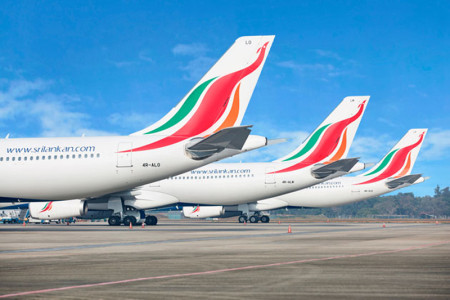Wide body fleet consists of 5 A330-200s 20.5 years old and 7 A 330-300s aged 7.8 years procured on dry lease
SriLankan Airlines (UL, Colombo International) is seeking five second-hand A320 Family aircraft and the same number of A330s for a six-year dry lease.
The carrier's Request for Proposals issued on December 19 2022 specifies that the A320s must not be older than 15 years at the time of their planned delivery to SriLankan Airlines. The airline is willing to evaluate A320-200s, A320-200Ns, A321-200s, and A321-200Ns.
The aircraft have to be configured in a two-class layout with a separate business class, although SriLankan Airlines did not specify a set number of seats.
Tentatively, all five should deliver in 2023, starting in June and concluding in December. While the airline is seeking aircraft on six-year leases, it would also consider offers of a three-year extension of aircraft already in its fleet but due to expire in 2023.
The most numerous version of Airbus' popular twin-engine aircraft is the A330-300, of which SriLankan Airlines currently flies seven examples. All of these are active, and they have an average age of just 7.9 years old, compared to a fleet-wide mean of 11.6 years. They each have 269 economy and 28 business class seats.
SriLankan Airlines Airbus A330.
SriLankan Airlines operates Airbus A330s on international routes that were strong in the pre-Covid period, including Australia, and China. India remains the flag-carrier’s largest market, though flights have been reduced from 125 to 90 each week.
With negligible domestic business, the airline is aggressively tapping the Indian market to fly via Sri Lanka to international destinations.
“Around 55 to 65 percent of r flights [in Airbus A330-300s] to Sydney with three dailies and a daily to Melbourne comprise passengers from Bangalore, Hyderabad, Delhi, Mumbai, and several secondary Indian cities
SL flies to nine destinations in India, which before the pandemic accounted for around 15 percent of revenues, and plans to add three more soon.
SL carries significant numbers of passengers to Middle Eastern countries from South India as its fares have been competitive with those of Indian and Gulf carriers. Many of the people on these flights are migrant workers in locations including Qatar and the UAE.
Last year, Sri Lankan President Ranil Wickremesinghe, who was then Prime Minister, called for partial privatization of SL and the need for restructuring as it faces payment obligations to suppliers.
It has now been almost 15 years since the Sri Lankan government reacquired all the shares in SL from Emirates, which had partially purchased the carrier in 1998.
In August, the government said it would sell a 49 percent stake in its catering and ground-handling business units. The State-Owned Enterprises Restructuring Unit is currently working on recommendations for the cabinet.
Now, as China reopens its borders, SLA has restarted operations in the first week of April with tri-weekly services to Shanghai, Beijing, and Guangzhou.
It has also begun offering international flights to Paris; Frankfurt, Germany; Kathmandu, Nepal; and Seoul, Korea
According to SOE restructuring unit The privatisation of loss-making carrier SriLankan Airlines (UL, Colombo International) should be finalised by June 30, 2024. the airline's transaction advisor, the International Finance Corporation (IFC), should come up with its proposal by the end of this year.
SLA a balance sheet
In the 12 months to March 31, 2023, SriLankan posted a local currency loss of LKR75.03 billion Sri Lankan rupees (USD232 million) on revenues of LKR365.17 billion (USD1.13 billion). However, this loss was due to the LKR currency depreciation and the impact on USD-denominated debt. SriLankan's management accounts are in USD as earnings and costs are predominantly in foreign currencies. On its USD accounts, the airline is either breaking even or marginally positive.
Restructuring plan
The restructuring plan entails the government retaining a 51% share, with the remaining 49% to be offered to another investor. If immediate restructuring measures are not implemented there will be concerns about the potential loss of jobs for approximately 6,000 employees at SriLankan Airlines


